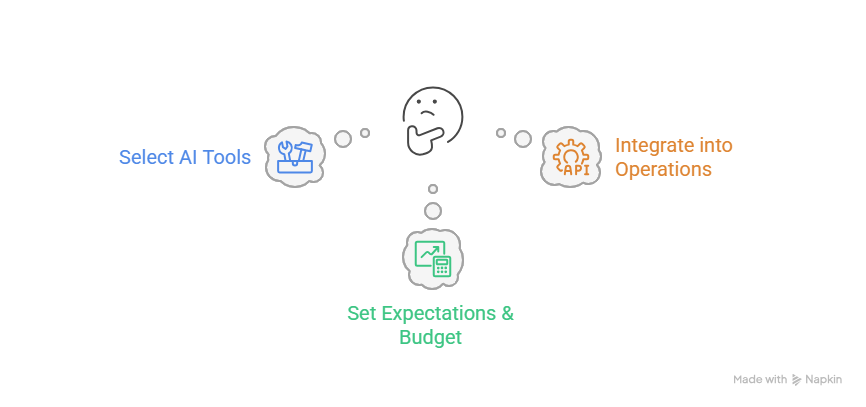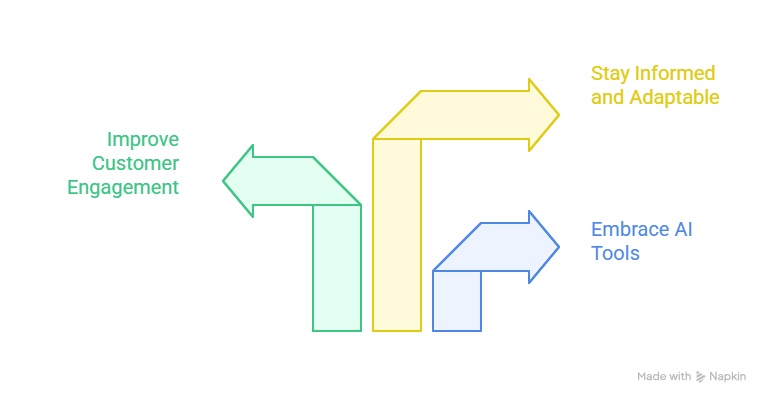Table Of Contents
1. Why AI Automation Is Critical for Small Business Success in 2025
AI automation is critical for small business success in 2025 because it dramatically enhances operational efficiency, reduces costs, and enables data-driven decision-making. By automating routine tasks like customer service, bookkeeping, and inventory management, small businesses can focus on strategic growth and deliver personalized customer experiences at scale. AI tools also provide real-time insights and predictive analytics, helping businesses anticipate market trends and optimize resources. This combination of efficiency, scalability, and smarter decision-making gives small businesses a competitive edge in a challenging economic landscape.
According to McKinsey, small businesses using AI-driven automation report up to 30% increase in productivity and 20-30% cost savings. The automation of routine tasks helps businesses focus more on innovation, customer relationships, and long-term strategy.
1.1 Unlocking Growth with AI: What Small Businesses Need to Know
Small businesses can unlock significant growth in 2025 by embracing AI automation to enhance customer service, streamline operations, and make data-driven decisions. AI-powered chatbots provide 24/7 support, improving engagement and freeing staff for strategic tasks. Generative AI helps create personalized marketing content and analyze market trends, enabling smarter resource allocation.
AI-powered solutions can also improve business agility. For example, businesses using predictive analytics can forecast sales trends, adjust inventory, and fine-tune marketing efforts—all based on data-driven insights. According to Stanford's AI Index Report, AI adoption among small businesses is growing by 25% year-over-year, as companies leverage these tools to stay competitive.
1.2 The Competitive Edge: Why AI Is Essential for Small Businesses in 2025
AI is essential for small businesses in 2025 because it delivers a competitive edge through enhanced customer service, data-driven decision-making, and operational efficiency. AI-powered tools like chatbots provide 24/7 support, improving customer engagement without increasing staff costs. Predictive analytics enable smarter inventory and pricing strategies, while AI automation streamlines workflows, freeing teams to focus on growth-driving tasks.
With 82% of small businesses recognizing AI as critical to competitiveness, adopting AI boosts scalability, innovation, and responsiveness to market changes. A 2024 report by the World Economic Forum also highlights that AI is expected to create 97 million new jobs globally by 2025, providing new opportunities for businesses that adopt AI early.
At Kovench, we specialize in providing tailored AI solutions that empower small businesses to harness the full potential of AI automation. By partnering with us, you can implement AI-driven strategies that not only enhance operational efficiency but also drive significant ROI. Our expertise in AI development and consulting ensures that your business is equipped to navigate the complexities of the digital landscape, ultimately leading to sustainable growth and a stronger market position.
2. AI Tools Every Small Business Should Use
Small businesses should leverage AI tools like Zapier for automating workflows, Copy.ai for generating marketing content, and DALL-E 3 to create custom images without design skills. Tidio offers AI chatbots to enhance customer service around the clock, while Surfer SEO helps optimize website content for better search rankings. For productivity, Notion AI streamlines note-taking and task management. These tools save time, reduce manual effort, and boost growth by enabling small teams to handle more tasks efficiently. Many offer free or affordable plans, making AI automation accessible for small business owners aiming to scale in 2025.
2.1 Customer Service Reinvented: AI-Powered Support for Instant Engagement
AI-powered customer service transforms small business support by delivering instant, personalized engagement through chatbots and virtual agents available 24/7. These AI tools automate routine inquiries, reduce wait times, and free human agents to focus on complex issues, boosting efficiency and customer satisfaction. Advanced AI can predict customer needs, offer proactive solutions, and seamlessly escalate to human support when needed. This approach not only cuts costs but also enhances loyalty by providing fast, consistent, and tailored experiences across multiple channels, helping small businesses grow and compete effectively in 2025.
2.2 Automated Marketing: Boosting Sales with Personalized Campaigns
Automated marketing uses AI to create personalized campaigns that target customers with tailored messages based on their behavior and preferences. This boosts sales by nurturing leads through customized content, improving engagement and conversion rates. Automation saves time by handling repetitive tasks like email scheduling and ad targeting, allowing small businesses to focus on strategy. It also enables precise audience segmentation and real-time campaign adjustments, ensuring messages resonate with each customer. By integrating customer data, businesses can deliver relevant offers that increase loyalty and drive growth efficiently in 2025.
At Kovench, we specialize in helping small businesses implement these AI tools effectively, ensuring that they achieve greater ROI through streamlined operations and enhanced customer engagement. Our consulting services guide clients in selecting the right tools tailored to their specific needs, maximizing the benefits of AI technology in their business strategies.
2.3 Content Creation: How AI Speeds Up Your Writing and Design
AI significantly accelerates content creation by automating writing and design tasks, enabling small businesses to produce high-quality blogs, social media posts, and visuals more efficiently. Tools like Anyword and Writer generate SEO-friendly drafts while ensuring brand voice consistency, allowing businesses to maintain a cohesive identity across platforms. Additionally, platforms like Canva leverage AI for image creation and editing, enhancing visual content without the need for extensive design skills. AI also streamlines repetitive edits, suggests phrasing alternatives, and repurposes long-form content into multiple formats, ultimately saving time and boosting productivity. This empowers entrepreneurs to concentrate on strategic initiatives and creative endeavors while scaling content output effectively in 2025.
2.4 Smart Inventory Management: Keep Your Stock on Point with AI
Smart inventory management with AI assists small businesses in maintaining optimal stock levels by utilizing machine learning to predict demand, automate reorder points, and track inventory in real time. This proactive approach reduces costly stockouts and excess inventory, leading to significant savings in both time and money while enhancing customer satisfaction. AI systems analyze sales trends, seasonality, and external factors to accurately forecast needs and automatically generate purchase orders. Real-time tracking across multiple sales channels ensures up-to-date stock visibility, enabling quick adjustments and minimizing human error. By implementing AI inventory tools, small businesses can streamline operations and focus on growth in 2025.
3. Getting Started with AI: A Step-by-Step Guide for Small Business Owners
To embark on your AI journey as a small business owner, consider the following key steps:
- Identify your biggest challenges where AI can provide solutions, such as repetitive tasks, slow customer responses, or insufficient data insights.
- Start small with ready-made AI tools that require no technical skills, such as Microsoft 365 Copilot for content and email, or Power Automate to streamline workflows.
- Test one AI tool at a time focused on a specific task to avoid overwhelm and maintain your business’s human touch.
- Track results after a few weeks to measure time saved or increased leads, then adjust or scale accordingly.
- Consider expert help from AI consultants to prioritize use cases, ensure security, and maximize ROI.
This structured approach enables you to integrate AI efficiently, saving time and fostering growth without incurring large upfront costs or facing technical barriers.

3.1 Choosing the Right AI Tools for Your Business Needs
Choosing the right AI tools starts with clearly defining your business needs. Identify specific challenges such as automating tasks, improving customer service, or enhancing marketing. Evaluate tools based on the following criteria:
- Features: Ensure the tool has the capabilities you require.
- Ease of use: Look for user-friendly interfaces that your team can adopt quickly.
- Integration with current systems: Check if the tool can seamlessly work with your existing software.
- Scalability: Choose tools that can grow with your business.
- Pricing versus ROI: Assess the cost in relation to the expected return on investment.
- Data security: Ensure the tool complies with data protection regulations.
At Kovench, we assist clients in navigating this selection process by providing tailored recommendations based on their unique operational needs. For instance, if a client aims to enhance customer engagement, we might suggest AI-driven CRM tools that integrate seamlessly with their existing systems, ensuring a smooth transition and immediate impact on customer satisfaction.
Take advantage of free trials to test usability and fit within your workflow, and gather team feedback before committing. Prioritize tools that align with your goals and technical capacity to ensure smooth adoption and measurable impact on growth and efficiency.
3.2 Setting Realistic Expectations and Budgeting for AI
Setting realistic expectations for AI means understanding that it excels at automating repetitive tasks but may not immediately transform complex processes. Small businesses should focus on incremental improvements rather than expecting instant, large-scale changes.
When budgeting for AI, consider the following:
- Initial development costs: Account for the upfront investment needed to implement AI solutions.
- Ongoing expenses: Include costs for data preparation, model retraining, and system maintenance, which can add 15–25% annually to the original budget.
Kovench helps clients establish a clear financial framework by providing detailed cost-benefit analyses, ensuring that they can anticipate expenses and align their AI investments with their strategic goals. Planning for these factors upfront helps avoid surprises and ensures sustainable AI benefits aligned with business goals. Clear goals and phased implementation improve ROI and manage resource allocation effectively.
3.3 Integrating AI Into Your Daily Operations
Integrate AI into daily operations by automating repetitive tasks such as data entry and customer emails to save time and reduce errors. Use AI-powered tools for customer support, such as chatbots, to provide instant responses and improve engagement. Additionally, leverage AI for data analysis to gain insights and optimize decision-making.
Kovench's expertise in AI integration allows us to customize solutions that fit seamlessly into your existing workflows, enhancing productivity without disrupting your operations. Establish flexible AI policies and gather employee feedback to ensure smooth adoption and continuous improvement. This approach boosts efficiency, allowing your team to focus on strategic growth activities while AI handles routine workflows effectively.
4. ROI and Metrics: Measuring the Success of AI Automation
Measuring the ROI of AI automation for small businesses involves tracking both traditional financial metrics and new performance indicators that capture time savings, efficiency, and customer impact. Key metrics include:
Start by establishing baseline data before AI implementation, such as current process times, error rates, and customer metrics. Use real-time dashboards and automation tracking tools to monitor ongoing performance. Regularly analyze these metrics to justify AI investments, optimize resource allocation, and guide continuous improvement. Effective measurement can reveal up to 8X ROI by demonstrating tangible business value beyond simple cost reduction.
4.1 Tracking Time Savings, Customer Satisfaction, and Revenue Growth
Tracking time savings, customer satisfaction, and revenue growth is essential for small businesses leveraging AI automation in 2025. To measure time savings, conduct before-and-after time studies and use AI system analytics to quantify hours saved on tasks like scheduling or inventory management. For customer satisfaction, track metrics such as Customer Satisfaction Score (CSAT) and Net Promoter Score (NPS) to gauge happiness and loyalty, helping reduce churn and improve retention. Finally, monitor revenue growth by analyzing marketing-sourced revenue, upsell rates, and overall sales increases linked to AI-driven efficiencies and personalized customer engagement. Regularly reviewing these metrics ensures informed decisions and maximizes AI’s impact on business growth.
4.2 Key Metrics for AI Success in Small Businesses
Key metrics for AI success in small businesses include cost savings, revenue growth, productivity improvements, and customer satisfaction. Tracking these helps quantify AI’s impact on operations and profitability.
Additional important metrics are customer acquisition cost (CAC), churn rate, and customer lifetime value (CLV), which reveal how AI influences marketing efficiency and retention. Measuring AI model performance through accuracy, precision, and recall ensures reliable outcomes and reduces errors.
Regularly monitoring these metrics with clear KPIs enables small businesses to optimize AI investments, maximize ROI, and drive sustainable growth in 2025. Starting with pilot programs and refining based on data is a practical approach to success. At Kovench, we specialize in helping businesses implement these strategies effectively, ensuring that your AI initiatives yield the highest possible returns. By leveraging our expertise, you can navigate the complexities of AI adoption and achieve measurable success tailored to your unique business goals.
5. Overcoming Challenges in AI Implementation
Overcoming challenges in AI implementation requires a clear strategy, quality data, and organizational readiness. At Kovench, we guide small businesses in defining specific AI goals that align with their operations to avoid disjointed efforts. Ensuring access to clean, relevant data is critical since AI models depend on it for accuracy. We assist clients in addressing legacy system integration; upgrading or modernizing infrastructure facilitates smoother AI adoption. Cultivating a culture open to change helps overcome employee resistance by framing AI as a productivity tool rather than a threat. Additionally, investing in internal AI skills and governance ensures responsible, scalable use. Finally, measuring AI’s impact on business outcomes—not just technical performance—guides continuous improvement and justifies investment.
5.1 Common Pitfalls and How to Avoid Them
Common pitfalls in adopting AI automation for small businesses include unclear goals, overreliance on technology without human oversight, and neglecting staff training. To avoid these pitfalls, define clear objectives aligned with business needs, maintain human involvement to ensure quality, and invest in employee education on AI tools. Kovench emphasizes starting with scalable AI solutions to manage costs and measuring ROI regularly to adjust strategies effectively. Being proactive about data privacy and ethical use also prevents compliance issues, ensuring AI supports sustainable growth without unintended risks.
5.2 Building an AI-First Culture: Tips for Business Owners
To build an AI-first culture, business owners should start by clearly defining their AI vision aligned with business goals, ensuring everyone understands why AI matters. Empower AI champions within the team to lead adoption and foster a growth mindset that encourages experimentation and learning from failure. Kovench advocates for investing in upskilling employees to confidently use AI tools and embed continuous learning. Establish ethical guidelines for AI use and measure outcomes regularly to refine strategies. Celebrate milestones to maintain momentum and reinforce commitment. This approach integrates AI deeply into operations, driving innovation and efficiency for sustained growth.
6. The Future of AI in Small Business: Trends to Watch in 2025 and Beyond
AI is moving beyond being a competitive advantage to becoming a core necessity for small businesses. From automation of repetitive tasks to advanced predictive insights, AI is enabling entrepreneurs to operate with the agility and intelligence of larger enterprises. In 2025 and beyond, the focus will shift toward more accessible, affordable, and domain-specific AI tools that empower small businesses to enhance customer experiences, optimize operations, and drive innovation. The future is not about replacing human creativity and decision-making, but about augmenting them with AI-driven efficiency, personalization, and scalability.

6.1 AI Innovations Shaping Small Business Success
AI innovations are revolutionizing small business success by automating repetitive tasks, enhancing decision-making, and enabling personalized customer engagement. Tools like ChatGPT and AI-powered analytics streamline marketing, customer service, and inventory management, allowing small teams to operate efficiently and scale without large workforces. AI-driven predictive analytics help forecast demand and optimize pricing, reducing costs and improving profitability. Additionally, AI automation frees entrepreneurs to focus on innovation and growth, leveling the competitive playing field with larger companies. With 75% of small businesses investing in AI by 2025, embracing these technologies is becoming essential for sustainable growth and operational excellence.
At Kovench, we specialize in helping small businesses harness these AI innovations to achieve greater ROI. By implementing tailored AI solutions, we enable our clients to automate processes, enhance customer interactions, and make data-driven decisions that drive profitability.
6.2 Preparing Your Business for the AI Future: What’s Next?
To prepare your small business for the AI future, start by developing a clear, business-led AI agenda that defines priority outcomes and secures leadership ownership. Identify specific areas where AI can improve efficiency, accuracy, and productivity, such as marketing automation or customer service enhancements. Invest in upskilling your team to work effectively alongside AI tools, fostering a culture of continuous learning and innovation. Build a hybrid AI expertise network by combining external AI partnerships with internal talent development. Focus on integrating AI across workflows to streamline operations and eliminate silos, using process mining to identify inefficiencies and automate routine tasks. Finally, prioritize early wins with measurable impact, allocate resources wisely, and plan for scalable AI investments to ensure sustainable growth in 2025 and beyond.
At Kovench, we guide businesses through this transformative journey, ensuring they are well-equipped to leverage AI for maximum impact and efficiency. Our consulting services are designed to align AI initiatives with your business goals, ultimately driving success and enhancing your competitive edge.
7. Conclusion: Transforming Small Businesses with AI Automation
AI automation is transforming small businesses by significantly boosting productivity, enhancing customer experiences, and enabling data-driven decision-making. By automating routine tasks, small businesses save valuable time and reduce costs, allowing owners and employees to focus on strategic growth initiatives. AI-powered personalization and predictive analytics help tailor services and anticipate market trends, giving small businesses a competitive edge traditionally reserved for larger enterprises. Embracing AI automation in 2025 empowers small businesses to operate more efficiently, innovate continuously, and scale sustainably, ultimately driving stronger growth and long-term success.
7.1 Why Starting with AI Today Will Give You a Competitive Advantage in 2025
Starting with AI today gives small businesses a competitive advantage in 2025 by enabling faster, data-driven decision-making, improving customer experiences, and automating routine tasks to boost efficiency. Early AI adopters can innovate more rapidly, anticipate market trends, and optimize operations, positioning themselves ahead of competitors still hesitant to integrate AI. This proactive approach reduces costs, accelerates growth, and enhances responsiveness to changing customer needs, making AI a critical tool for sustainable success in the evolving business landscape.
8. Kovench: Empowering Small Businesses to Thrive with AI Automation
Kovench empowers small businesses to thrive with AI automation by providing intelligent solutions that cut costs, optimize workflows, and boost growth. Their AI tools deliver real-time intelligence and predictive analytics, helping businesses uncover trends, anticipate customer needs, and make data-driven decisions with confidence. By automating repetitive tasks and streamlining operations, Kovench enables teams to focus on creative, high-value work, increasing productivity and employee engagement. Small businesses gain a competitive edge through superior customer service, personalized experiences, and faster response times. Kovench’s accessible AI solutions make it easier for small businesses to scale efficiently, innovate continuously, and adapt quickly to market changes—turning AI automation into a powerful driver of sustainable growth in 2025 and beyond.
8.1 Maximize Efficiency and Growth: How Kovench’s AI Solutions Drive Business Success
Kovench’s AI solutions maximize small business efficiency and growth through a three-phase approach: discovery and integration of tailored AI tools, optimization to fine-tune workflows, and innovation to scale operations and uncover new opportunities. Their AI-driven automation streamlines complex processes, enhances customer engagement, and secures transactions with blockchain technology. Predictive analytics enable faster, data-driven decisions, while continuous learning improves resource allocation and workflow consistency. This results in reduced manual work, improved accuracy, and scalable growth, empowering small businesses to compete effectively and boost ROI in 2025.
8.2 Partner with Kovench for Seamless AI Integration: Helping Small Businesses Achieve Big Results
Partnering with Kovench enables small businesses to seamlessly integrate AI automation tailored to their unique needs, driving efficiency and growth. Kovench’s AI solutions streamline operations, enhance customer engagement, and secure transactions with blockchain technology, delivering measurable results without complex setups. Their expertise helps businesses reduce manual tasks, improve decision-making with predictive analytics, and scale confidently.
By collaborating with Kovench, small businesses gain access to cutting-edge AI tools that boost productivity and competitive advantage, turning AI integration from a challenge into a strategic asset for big results in 2025.







